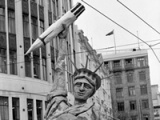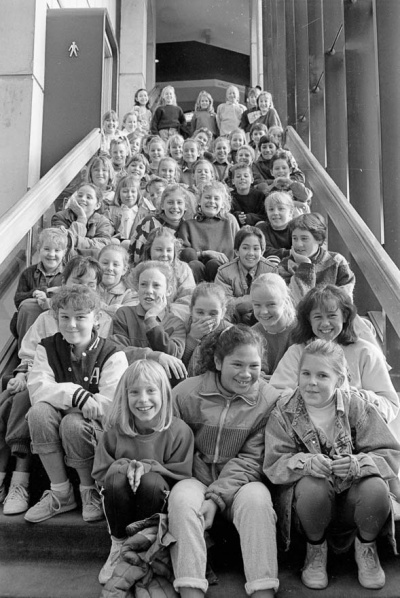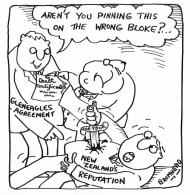Articles
1981 Springbok tour

For 56 days in July, August and September 1981, New Zealanders were divided against each other in the largest civil disturbance seen since the 1951 waterfront dispute. The cause of this was the visit of the South African rugby team – the Springboks.
-
Page 6 – Battle lines are drawn
The tour supporters were determined that the first Springbok visit to New Zealand since 1965 would not be spoiled. The anti-tour movement was equally determined to show its
-
Page 7 – Tour diary
Select itinerary of the 1981 tour by the Springbok rugby team.
-
Page 8 – Impact
In Hamilton the protestors occupying the pitch had chanted 'The whole world is watching'. The same applied to New Zealand as a nation. Some believed the tour was an opportunity
Homosexual law reform

The homosexual law reform campaign moved beyond the gay community to wider issues of human rights and discrimination. Extreme viewpoints ensured a lengthy and passionate debate before the Homosexual Law Reform Act was passed 27 years ago, in July 1986.
- Page 1 - Homosexual law reform in New ZealandThe homosexual law reform campaign moved beyond the gay community to wider issues of human rights and discrimination. Extreme viewpoints ensured a lengthy and passionate debate
The 1980s

Some look back at the 1980s with a mixture of amusement and embarrassment. Big hair and big fashion in a range of electric neon colours evoke a decade in which more very definitely meant more. But this was also a decade of profound political and social change, when the ‘baby boomers’ took charge.
-
Page 2 – Overview
An overview of the key social, political and cultural events of 1980s New Zealand
-
Page 3 – 1980 - key events
Key events in New Zealand history from 1980
-
Page 4 – 1981 - key events
Key events in New Zealand history from 1981
-
Page 5 – 1982 - key events
Key events in New Zealand history from 1982
-
Page 6 – 1983 - key events
Key events in New Zealand history from 1983
-
Page 7 – 1984 - key events
Key events in New Zealand history from 1984
-
Page 8 – 1985 - key events
Key events in New Zealand history from 1985
-
Page 9 – 1986 - key events
Key events in New Zealand history from 1986
-
Page 10 – 1987 - key events
Key events in New Zealand history from 1987
-
Page 11 – 1988 - key events
Key events in New Zealand history from 1988
-
Page 12 – 1989 - key events
Key events in New Zealand history from 1989
-
Page 13 – Further information
Links and books relating to the 1980s in New Zealand
Nuclear-free New Zealand

The sinking of the Greenpeace protest ship Rainbow Warrior in Auckland in July 1985 shocked the nation. The incident galvanised an anti-nuclear movement that had emerged in opposition to both French nuclear tests at Mururoa and American warship visits to New Zealand.
-
Page 5 – Sinking the Rainbow Warrior
In 1985 New Zealand was basking in its position as leader of the anti-nuclear movement. Then on 10 July, two explosions set by French Secret Service agents ripped through the
Waitangi Day

Every year on 6 February, New Zealand marks the signing of the Treaty of Waitangi in 1840. For most people, Waitangi Day is a holiday; for many, and especially for Māori, it is a time for reflecting on the Treaty and its place in modern New Zealand.
- Page 6 - Waitangi Day 1980sThe 1980s brought changes in the way Waitangi Day was marked officially, as well as growing Māori
Related keywords
- education
- MPs
- economy
- protest
- olympics
- cartoon
- robert muldoon
- australia
- international trade
- CER
- nuclear ships
- samoa
- citizenship
- rugby
- south africa
- falklands war
- alcohol
- poster
- tourism
- springboks
- david lange
- elections
- parliament
- film
- the speaker
- public holidays
- waitangi day
- race relations
- hikoi
- governor-general
- david beattie
- gay rights
- maori language
- te reo māori
- radio broadcasts
- homosexuals
- norman jones
- badges
- invercargill
- shipping
- rainbow warrior bombing
- greenpeace
- international relations
- nuclear free
- anzus
- cold war
- maps
- children
- parliament buildings
- police
- palmerston north
- christchurch
- royalty
- royal tours
- prince of wales
- prince william
- kiwiana
- apartheid
- gleneagles agreement
- americans
- law reform
- human rights
- sport
- demonstrations
- mururoa protest
- hamilton
- all blacks
-
Main image: Karori Normal School choir, 1989
The Karori Normal School choir in Wellington's Michael Fowler Centre.



































